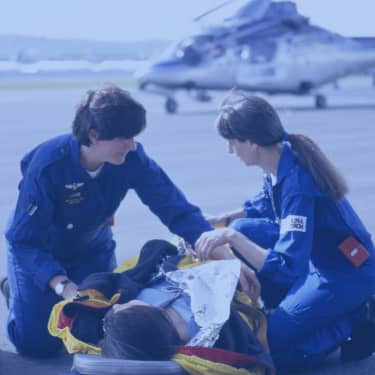What Is a Critical Care Transport Nurse?
 Credit: Kriangkrai Thitimakorn / Moment / Getty Images
Credit: Kriangkrai Thitimakorn / Moment / Getty ImagesMedical care doesn’t always take place within the walls of a hospital. Emergencies can occur anywhere, and sick and injured patients need care while en route to the nearest hospital. Sometimes patients must be transported between facilities to access the care they need.
Critical care transport nurses travel with patients in ambulances or on aircraft, providing necessary medical care until they reach their destination. The following guide explores this fast-paced nursing career, including how to become a critical care transport nurse and what you can expect.
How Long to Become:
2-6 years
Job Outlook:
6% growth from 2021-2031
Average Annual Salary:
$79,930
What Does a Critical Care Transport Nurse Do?
Critical care transport nurses ensure patients arrive at healthcare facilities safely and in the most stable condition possible. These registered nurses (RNs) perform a variety of emergency and non-emergency procedures in confined spaces with limited access to equipment.
Critical care transport nurses care for patients of all ages in both emergency and routine transfers. In emergencies, the nurse’s role is to provide life-saving care to stabilize the patient until they arrive at the hospital. They must constantly monitor vital signs, administer medication, work to stop bleeding, and perform emergency procedures like CPR, tracheostomies, and intubations.
Transport nurses also travel with patients in stable condition who need constant monitoring during transfers between facilities. These trips may include routine care, like monitoring vital signs and administering medication. Sometimes, they require more intensive interventions or emergency care if the patient’s condition rapidly changes.

Keith Brofsky / DigitalVision / Getty Images
Key Responsibilities
- Providing routine and emergency medical care
- Performing ongoing patient assessments
- Communicate with medical teams and receiving facilities about patient condition
Career Traits
- Fast-paced
- Critical thinking and decision-making
- Critical care nursing skills
Where Do Critical Care Transport Nurses Work?
Critical care transport nurses help transport patients between hospitals or other healthcare settings in ambulances, aircraft, and other vehicles. This means they work in smaller, more confined areas and have limited equipment and tools.
Ambulances
Working in the back of an ambulance can mean quickly changing conditions as the driver navigates traffic, weather, and other obstacles. Nurses must adjust to changes in the terrain and in the patients they’re caring for. In a single day, an ambulance can transport patients of all ages, sizes, and conditions.
Airplanes and Helicopters
Flight nurses are critical care nurses that work aboard medical aircraft, keeping patients stable during flights between facilities. They manage the patient during takeoff, landing, and during periods of turbulence. Altitude can also influence the patient’s condition, so the nurse needs to adjust during those changes.
Ships
Working as a nurse on a ship presents many of the same challenges as flight and ambulance nursing. In addition to nursing, they need knowledge of maritime safety regulations and the ability to work in an constantly changing environment that may not always be physically stable.
How to Become a Critical Care Transport Nurse
Becoming a critical care transport nurse begins the same as any other nursing career — with nursing education.
Critical care transport nurses must have a nursing degree from an accredited program and pass the NCLEX to be eligible for RN licensure.
Most employers prefer nurses with a bachelor’s of science in nursing (BSN) and experience in medical/surgical or critical care nursing for these roles. At a minimum, nurses need to have a valid RN or APRN license and basic life support and advanced life support certifications. Pediatric advanced life support certification is also recommended and may be a requirement for some positions.
Becoming a certified transport registered nurse (CTRN) is also recommended. Licensed RNs with at least two years of experience in their specialty area can take the exam to earn the CTRN credential. Some nurses also opt for certification in critical care registered nursing (CCRN). RNs and APRNs can take the adult CCRN certification exam with a minimum of two years of direct care experience for acute or critically ill patients.
How Much Do Critical Care Transport Nurses Make?
Critical care nurses earned an average salary of $79,930 as of December 2022, reports Payscale. Nurses with 5-10 years of experience earn an average of $85,000 per year. Note that these figures refer to earnings for a critical care nurse. More data is needed to report earnings for critical care transport nurses, specifically.
Critical care transport nurses are important in the healthcare delivery system. As an aging population requires more advanced care — meaning more transfers between facilities — and rural hospitals struggle to keep up with demand, the need for medical care for patients during transport is increasing.
The Bureau of Labor Statistics projects that demand for RNs will grow by 6% from 2021-2031, which is about as fast as average. As nurses retire and leave the field, new nurses need to fill those roles.While job growth data for critical care transport RNs is not available, it’s reasonable to expect growth in all RN positions in the coming years.
Frequently Asked Questions About Critical Care Transport Nurses
What do Critical Care Transport Nurses do?
Critical care transport nurses care for patients in transit between healthcare facilities and accident/emergency sites and hospitals. They monitor patient condition, administer medication, and perform life-saving procedures when necessary to stabilize the patient.
Where do Critical Care Transport Nurses work?
Critical care transport nurses work in ambulances as part of emergency services and transport crews. They may be employed by hospitals, nursing homes, rehabilitation facilities, or municipal emergency services departments. They also work on medical aircraft and ships.
What is the difference between nurses and paramedics?
Traditionally, paramedics respond to emergency calls and care for patients en route to a medical facility, while nurses provide bedside care. While there is an overlap in duties, critical care transport nurses have more education than paramedics and an RN license, pulse emergency response and transport training.
What is a critical care transport unit?
A critical care transport unit (CCT) is a hospital-based transport program that uses fully-equipped ambulances and aircraft to transport critically-ill patients between facilities. Patients requiring CCT need intensive care and monitoring beyond the paramedic’s scope of practice. Critical care transport nurses are integral to providing care in these life-threatening situations.
Related Pages
Page last reviewed December 13, 2022




